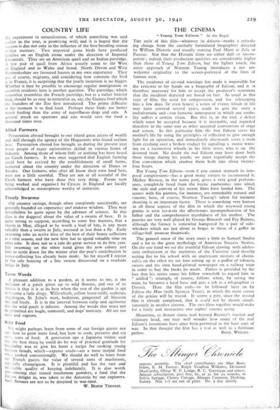THE CINEMA
Young Tom Edison." At the Regal.
THE style of this film—whatever its defects—marks a refresh- ing change from the carefully formulated biographies directed
by William Dieterle and usually starring Paul Muni as Zola or Pasteur. Not that the Dieterle films are either dull or incom-
petent ; indeed, their production qualities are considerably higher than those of Young Tom Edison, but the lighter touch, the airier approach of Norman Taurog introduces a not un- welcome originality to the screen-portrayal of the lives of famous men.
The incidence of air-raid warnings has made it impossible for the reviewer to lay hands on a biography of Edison, and it is therefore necessary for him to accept the producer's statement that the incidents depicted are based on fact. As usual in this type of film, the need for compression, and for telescoping into a few days (Or even hours) a series of events which in life may have covered several years, tends to give the story a melodramatic and t ven fantastic atmospnere in which our credu- lity suffers a certain strain. But this is, in the end, a defect which must be accepted because it is inevitable, and regarded therefore in the same way as other accepted conventions of stage and screen. In this particular film th.: boy Edison saves his mother's life by using the principles of reflection to give enough light for an operation, and immediately afterwards saves a train from crashing over a broken viaduct by signalling a morse warn- ing on a locomotive whistle to his little sister, who is on the doomed train. No doubt the real Edison may have done both these things during his youth; we must regretfully accept the film convention which crushes them both into about twenty- four hours.
But Young Tom Edison—even if you cannot stomach its tem- poral compressions—has a great many virtues to recommend it. Mickey Rooney, in the name part, gives a very good perform- ance, completely freed from the hectic exuberance into which the style and content of his recent films have landed him. The scenes with his parents, for instance, are remarkably natural and sincere; here, of course, Norman Taurog's talent for intimate shooting is an important factor. There is something very human in all those aspects of the film in which the wayward young genius is seen vis-a-vis the affectionate incomprehension of his father and the comprehensive trustfulness of his mother. The parents are very well played by George Bancroft and Fay Bainter, although the former is somewhat hampered by a pair of side- whiskers which are just about as bogus as those of a gaffer in village-hall amateur theatricals.
The general tenor of the story owes a little to Samuel Smiles and a lot to the great mythology of American Success Stories.
On the one hand we see the youthful Edison clawing with adoles- cent enthusiasm at the mysteries of the Universe (and thereby setting fire to his school with an unpleasant mixture of chemi- cals); on the other we see him setting up as a pedlar of tobacco, sweets and his own hand-printed newspaper on a railway train in order to buy the books he wants. Pathos is provided by the fact that his antics cause his fellow townsfolk to regard him as " addled "; triumph, of course, follows when, by saving the train, he becomes a local hero and gets a job as a telegraphist Et Detroit. Here the film ends—to be followed later on by Edison the Man (with Spencer Tracy), in which the main career of the genius will be traced. It seems a pity, since the second film is already completed, that it ccu!d not be shown simul- taneously in another cinema. The two films together would make for a lively and instructive two nights' cinema going.
Meantime, as distant sirens wail beyond Rooney's tousled and visionary head, one may well wonder how many of the real Edison's inventions have since been perverted to the base uses of war. In that thought the film has a real as well as a fictitious


























 Previous page
Previous page